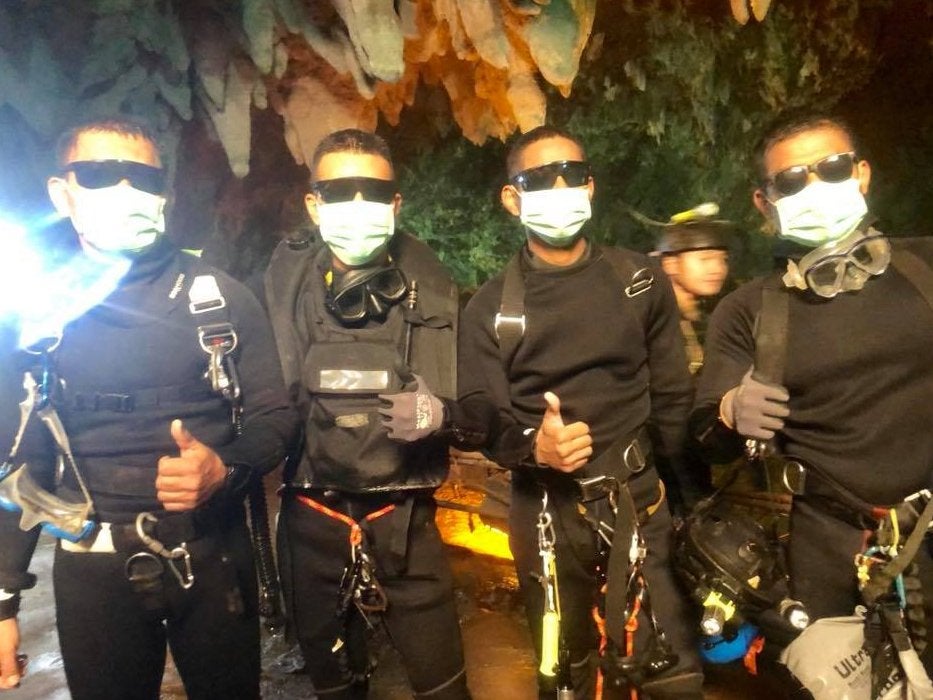Thai cave rescue: Boys 'skinny but doing well' as divers reveal just how close their mission came to disaster
Some divers say main pump failed during Tuesday night’s clean-up operation, causing water levels to rise rapidly with 100 still inside cave

Your support helps us to tell the story
From reproductive rights to climate change to Big Tech, The Independent is on the ground when the story is developing. Whether it's investigating the financials of Elon Musk's pro-Trump PAC or producing our latest documentary, 'The A Word', which shines a light on the American women fighting for reproductive rights, we know how important it is to parse out the facts from the messaging.
At such a critical moment in US history, we need reporters on the ground. Your donation allows us to keep sending journalists to speak to both sides of the story.
The Independent is trusted by Americans across the entire political spectrum. And unlike many other quality news outlets, we choose not to lock Americans out of our reporting and analysis with paywalls. We believe quality journalism should be available to everyone, paid for by those who can afford it.
Your support makes all the difference.All 12 boys and the football coach saved from a flooded cave in Thailand are skinnier for their ordeal but generally in good condition, health officials have said, as new details emerged of a rescue operation that could easily have ended in disaster.
Thailand and the international community reacted with a mixture of relief and gratitude as the last group of boys emerged on Tuesday night from the Tham Luang cave, where they had been trapped for 17 days.
A doctor and three navy Seals who had kept a vigil with the boys since they were found last Monday were among the last to leave the cave system, emerging to cheers and applause from other rescue workers.
But according to some divers involved in Tuesday’s final mission, there was a hair-raising moment just hours after the last boy left the cave when the main pump failed, causing water levels to rise suddenly.

One diver, who has not been named, was quoted in the Guardian as saying he heard screams coming from deeper within the caves as those working to clean up all the equipment used in the rescue ran to escape the rising waters, their headlamps flashing in the dark.
“The screams started coming because the main pumps failed and the water started rising,” he said. “All these headlights start coming over the hill and the water was coming ... It was noticeably rising.”
At that time there were still around 100 people working in the cave, some as far as 1.5km (0.9 miles) in. They were all able to get out safely, however.
At a news conference on Wednesday morning, Commander Glenn McEwan of the Australian Federal Police – leading the 19-strong Australian contingent of the rescue effort – was asked what might have happened if the pump had failed while the boys were still inside.
He said: “Of course it would have been harder. But the pumps had worked and they greatly assisted the accessibility and allowed the effort to continue and be as successful as it was.
“Speculation is probably not warranted right now,” he said, adding that you could always have “a million what ifs”. “We are here to celebrate the success; the pumps did work and did greatly assist our endeavours.”
All 12 boys and their coach are currently in quarantine in the main hospital in Chiang Rai city, after those rescued on Tuesday night were flown by helicopter to join their teammates.
Thongchai Lertwilairattanapong, an inspector for Thailand’s health department, told reporters the boys had lost an average of 2kg each in weight during their time trapped in the cave.
“From our assessment, they are in good condition and not stressed. The children were well taken care of in the cave,” he said.
Parents of the first four boys freed on Sunday have been able to visit them but had to wear protective suits and stand 2m away as a precaution.
Thongchai said one from the last group rescued on Tuesday had a lung infection and they were all given vaccinations for rabies and tetanus.
Thai prime minister, Prayuth Chan-ocha, made a televised statement thanking everyone involved in the mission who “shared their expertise, manpower and equipment”.
Official help came from Britain, the United States, Japan, Laos, Myanmar, China and Australia, a government document showed. There were also volunteers from Denmark, Germany, Belgium, Canada, Ukraine and Finland.
Commander McEwan acknowledged the degree of international cooperation “in a very unfriendly environment”.
“It is amazing what the human being can do. There are extraordinary people doing extraordinary things,” he said. “We are humbled to have been a part of it. Returning the Wild Boar soccer team safely into the arms of their loved ones is the good news of the year,” he said.
The dramatic rescue dominated front page headlines in Thailand on Wednesday.
“Hooyah! Mission accomplished,” read one, echoing the rallying cry of the Thai navy Seals involved in the rescue.
The hashtag #Hooyah was also hugely popular with Thai users online wanting to show their support for the hundreds of rescuers, including divers from around the world, who helped to get the boys out.
Join our commenting forum
Join thought-provoking conversations, follow other Independent readers and see their replies
2Comments